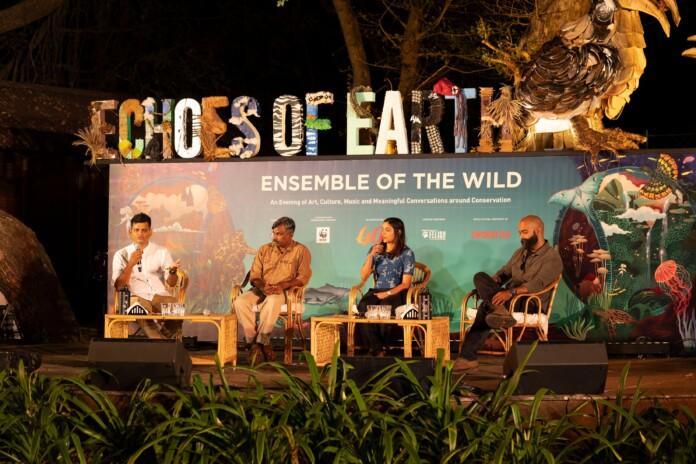Panaji: Top Goan environmentalists insist that time is of the essence to revive a popular reconnect with Goa’s biodiversity to aid overall conservation efforts and local eco-entrepreneurs can stand to benefit economically by implementing sustainable eco-tourism modules.
The experts also mulled the definition of an ideal ec0-tourist at ‘Ensemble of the Wild: An Evening of Art, Culture, Music and Meaningful Conversations Around Conservation’, a curtain-raiser event of Echoes of Earth, India’s greenest festival, that provided a platform to raise widespread awareness about eco-sensitivity vis-à-vis discursive panel discussions, art and music on the ecological significance of the state’s rich biodiversity, especially in the Western Ghats region.
Titled ‘Ecotourism: A Guardrail towards Protecting Goa’s Biodiversity – in association with the Goa State Biodiversity Board’, the event’s first panel discussion, moderated by Pradip V. Samorkadam, Member Secretary, Goa State Biodiversity Board, featured Nirmal Kulkarni, herpetologist and wildlife photographer, Rajendra Kerkar, general secretary, Mhadei Bachao Abhiyan Goa and member of the Goa State Wildlife Advisory Board and Professor M.K Janarthanam, chairperson of the Goa State Research Foundation.
“Goa’s venture into ecotourism has an amazing future and we have the potential to become a model state for responsible ecotourism in India, only if it is carried out with small groups of people with appropriate guidelines in place that should be formulated in tandem with the local communities. There are also platforms where people are being trained to respectfully showcase Goa’s magical biodiversity,” stated Kulkarni.
The definition of an ideal ecotourist was also discussed by the panellists, with Janarthanam stating that education is a must for ecotourists as “ecotourism entails conservation, people who visit these ecologically sensitive sites should make an effort to learn about the local flora, fauna and cultural values of the local people attached to the environment. Only these tourists are fit to be called ecotourism stakeholders.”
“A majority of forest systems are protected by the indigenous tribal people since time immemorial. Ecotourists need to be respectful of the spaces in which they are entering, avoid littering and adhere to the local customs,” added Kerkar.
Kerkar also highlighted the importance of respecting sacred groves and medicinal water bodies and stated that “the need of the hour is to create awareness surrounding the ecological importance of Goa’s ecology as a whole and increase the overall environment literacy.”
The second panel discussion, moderated by Aditya Kakodkar, Senior Coordinator, Marine Conservation, titled ‘Tales from the Wild: Exploring Goa – A Western Ghats Wonderland – in association with the World Wide Fund for Nature-India (WWF-India)’ further detailed the ecological diversity of the endangered Western Ghats region.
Panellists Paresh C. Porob, Range Forest Office, Goa Forest Department, Dr Nandini Velho, Project Lead, Canopy Collective and ORA India Fellow and Benhail Antao, wildlife rescuer and National Geographic show presenter at ‘Snakes SOS: Goa’s Wildest’ shared personal experiences and encounters with the Western Ghats’ flora and fauna.
The key theme the panellists discussed was the necessity of reconnecting with nature as a means of inculcating the spirit of conservation in both the old and new generations. Velho recounted instances from her childhood in which her father was instrumental in educating her about the importance of the natural world, leading to her becoming one of India’s leading conservation experts.
“Today, we need to expose our children to the majesty of the natural world and tell them about the elephants, leopards, tigers, sloth bears and even fungi. This is the only way to make them value and want to protect Goa’s ecology,” stated Porob.
“Respect for ecological diversity will subsequently translate to responsibility towards the environment and reduce the negative outcomes of human-animal interactions and resultant imbalances in the ecosystem,” said Antao, who recounted his experience of rescuing a king cobra who was stuck in tar at a roadside.
The keynote speaker for the event, Suneel Anchipaka (IAS) Director of Tourism, also highlighted ways in which ecotourism can be sustainably carried out by presenting the Goa Tourism Development Corporation’s master plan.
“The focus is on sustainable and responsible quality tourism to empower local communities by creating employment opportunities as per Goa’s G20 declaration. The key theme is ‘Goa Beyond Beaches’ under which we have launched the Homestay policy and also introduced a Caravan policy to promote experiential tourism,” said Anchipaka.
Aligning with Goa’s environmentally conscious ethos and backed by the Goa Tourism Board, this one-of-a-kind event open to all ages, held at the Panjim Gymkhana, highlighted the ecological importance of the Western Ghats and the state of Goa and delivered an amalgam of art, culture, music, and conservation with sustainability and conservation at its core.
As part of Echoes of Earth’s awareness initiative, there are a host of events conducted by experts in the field of conservation planned over the next few weeks which include a ‘Seaweed Walk’, ‘Mangrove Walk & Nature Journaling’ and ‘Beekeeping Educational Workshop’, among others.



